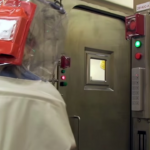Rethinking a WMD-free Middle East: Start with chemical weapons
By Jacob Greene | November 30, 2013
WMDFZ, shorthand for a weapons-of-mass-destruction-free zone, was the buzzword in arms control in 2012. But the year ended with the postponement of a planned December conference on establishing a WMDFZ in the Middle East. Given the difficulty of achieving an Arab-Israeli agreement on the preconditions necessary for such a regime, the United States and other nations saw few prospects for success. Nonetheless, the conference represented an important effort to strengthen regional and global security.
Despite the setback, recent political developments in Syria, Iran, and Egypt have created a climate conducive to the establishment of one pillar of the WMDFZ: a chemical-weapons-free zone. Some may question the utility of a stand-alone zone. But the history of weapons of mass destruction (WMD) shows that, with the exception of World Wars I and II, all WMD-related mass-casualty atrocities have been both chemical in nature and carried out in the Middle East. These chemical attacks include North Yemen in the 1960s, Iran in the 1980s, Iraq in 1988, and, most recently, Syria in 2013. Casualty figures for these events vary according to source, but they undoubtedly constitute a disproportionate number of the total victims of WMD.
Based on this historical context, a Middle East chemical-weapons-free zone is a logical preliminary step toward combating further proliferation and use of weapons of all types. It also brings together all of the regional players in a single framework, allowing for greater cooperation on security issues and contributing to the Middle East peace process as a whole.
Given the numerous violations of global norms against chemical weapons use, codifying the illegality of this behavior under a regional governance mechanism could help to reverse a growing, dangerous trend. This is imperative. Because chemical weapons are considered weapons of mass destruction—grouped under the same umbrella as nuclear and biological weapons, which blurs the stark differences between these three categories—chemical attacks weaken the entire WMD nonproliferation regime.
The conditions for establishing a chemical-weapons-free zone in the Middle East have never been better. Recent developments in the region have created a favorable political climate for considering such a zone:
Syria. Previously one of the three regional non-Parties to the Chemical Weapons Convention (CWC), and possessor of what was believed to be one of the largest chemical weapons stockpiles, Syria acceded to the CWC last month and placed its stockpile under the control of the Organization for the Prohibition of Chemical Weapons. Syrian weapons no longer complicate plans for a weapons-free zone, and the Assad regime has effectively forfeited its “chemical trump card” for other future regional security initiatives.
Iran. Similarly, negotiations over the Iranian nuclear program between Tehran and the six world powers known as the P5+1 have made considerable progress in the months following the election of moderate politician and former nuclear negotiator Hassan Rouhani—including the recent adoption of a Joint Plan of Action that places limits on uranium enrichment. With the diplomatic momentum of nuclear negotiations, the triumph of Syrian accession, and an Iranian president generally open to greater multilateral cooperation, the time is ripe to hammer out a regional nonproliferation governance regime. Two non-parties to the convention remain in the way, however.
Egypt. The only remaining Arab non-signatory to the Chemical Weapons Convention is Egypt. After Syrian accession, the Arab boycott of the chemical and biological weapons conventions—a resistance strategy meant to gain political leverage over Israel and to balance its regional nuclear weapons monopoly—is now severely strained, and Egypt’s unwavering position appears increasingly irrational. Considering the limited value of chemical weapons in deterring a nuclear attack, and the diplomatic capital Egypt would accrue if it signed and ratified the CWC, Egypt’s cost of resistance tremendously outweighs its potential gains. Now under the leadership of Foreign Minister Nabil Fahmy, a strong proponent of either a nuclear-weapons-free zone or an all-inclusive WMD-free zone, Egypt is in a position to follow through on its 1974 and 1990 commitments to nonproliferation—but only if it prioritizes global and regional security over maintaining an historical rivalry with Israel.
Israel. The other non-party to the Chemical Weapons Convention, Israel, has hinted at a willingness to ratify the treaty, provided its Arab counterparts do the same. (Israel signed the Chemical Weapons Convention in 1993 but has never ratified it.) Now that Syria is bound by the convention, Egyptian cooperation and Israeli engagement could make the chemical weapons-free zone a reality.
While transforming such a theoretical idea into a functional policy normally would be no easy undertaking, the current political circumstances are probably as close to ideal as they will ever be. Furthermore, everyone in the region has an interest in, and desire for, creating such a regime. Even the structural and procedural framework—laid out in previous strategies for implementing a WMDFZ or a nuclear-weapons-free zone, and for verifying compliance—already exists. The only additional element required is the sincere political will of the region’s leaders.
Together, we make the world safer.
The Bulletin elevates expert voices above the noise. But as an independent nonprofit organization, our operations depend on the support of readers like you. Help us continue to deliver quality journalism that holds leaders accountable. Your support of our work at any level is important. In return, we promise our coverage will be understandable, influential, vigilant, solution-oriented, and fair-minded. Together we can make a difference.
Topics: Biosecurity, Voices of Tomorrow














